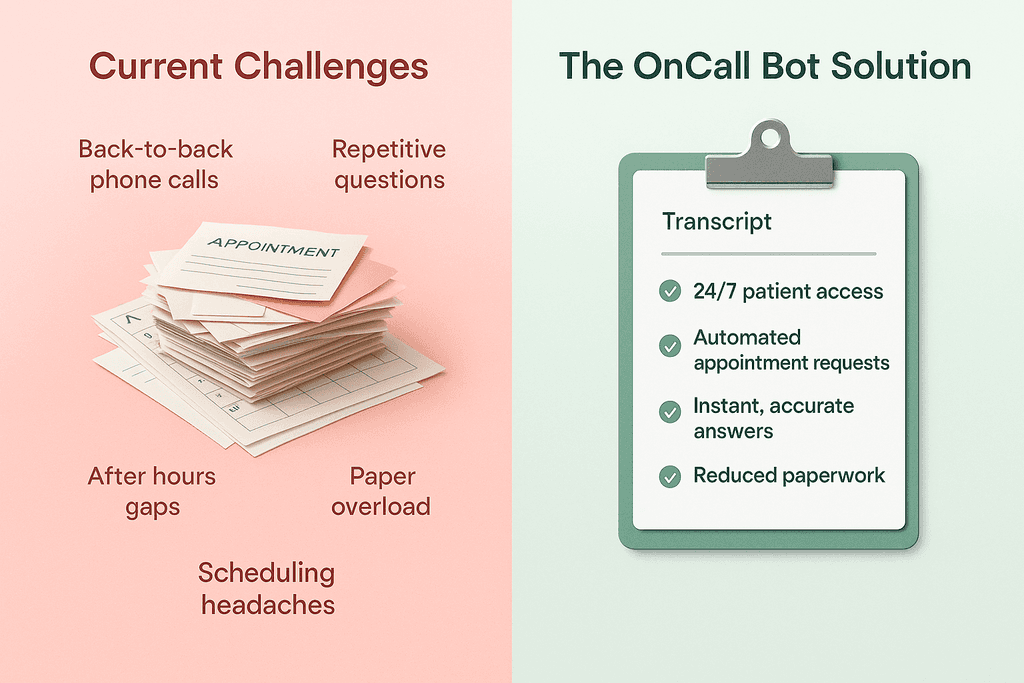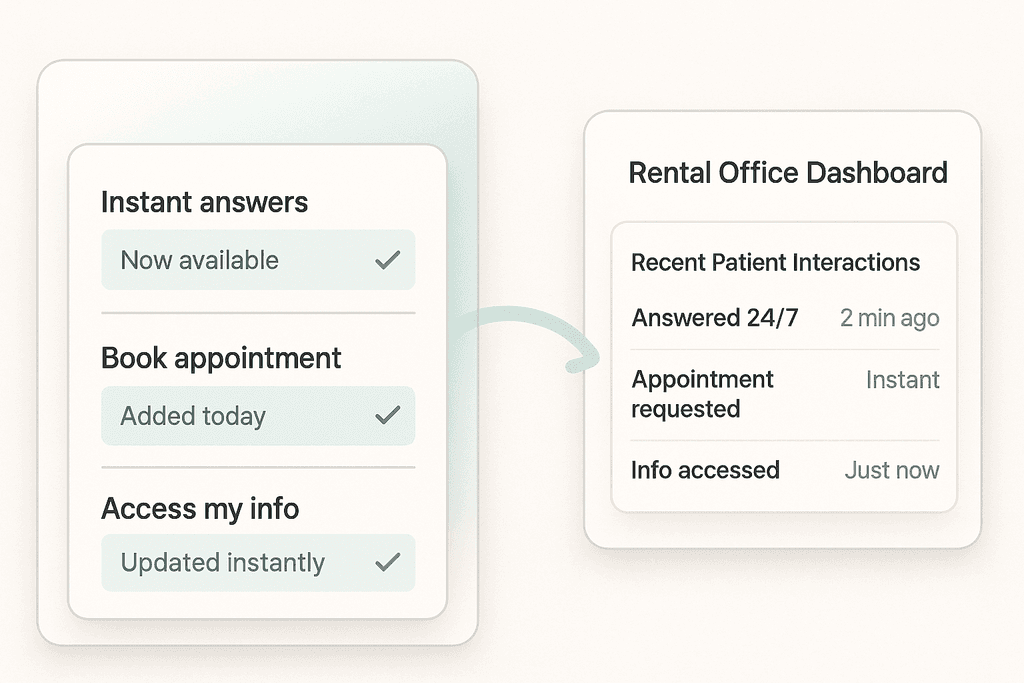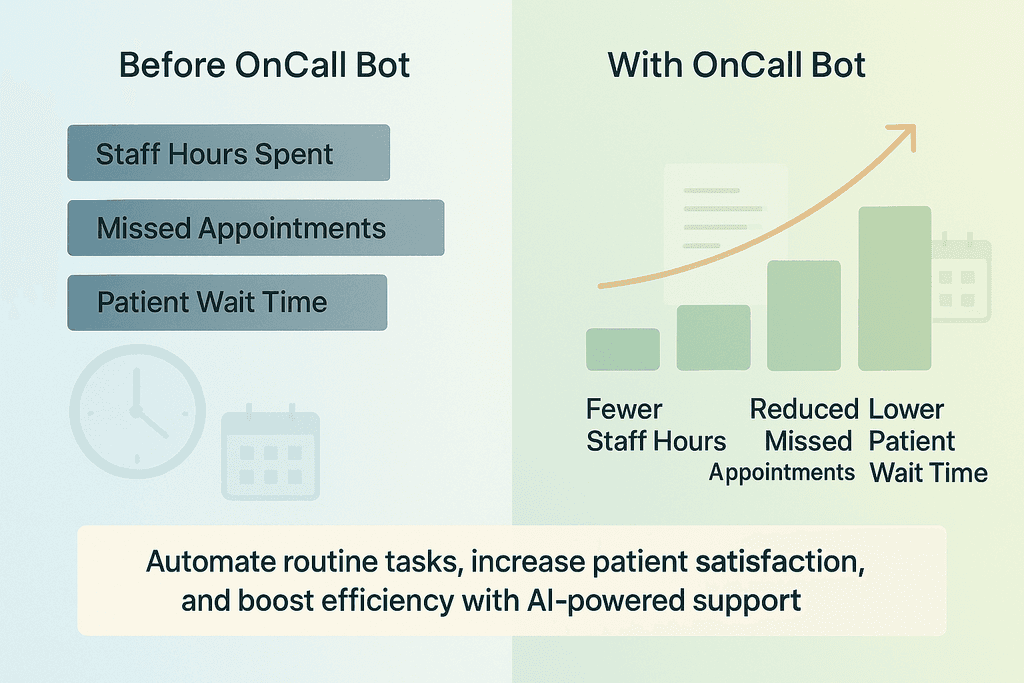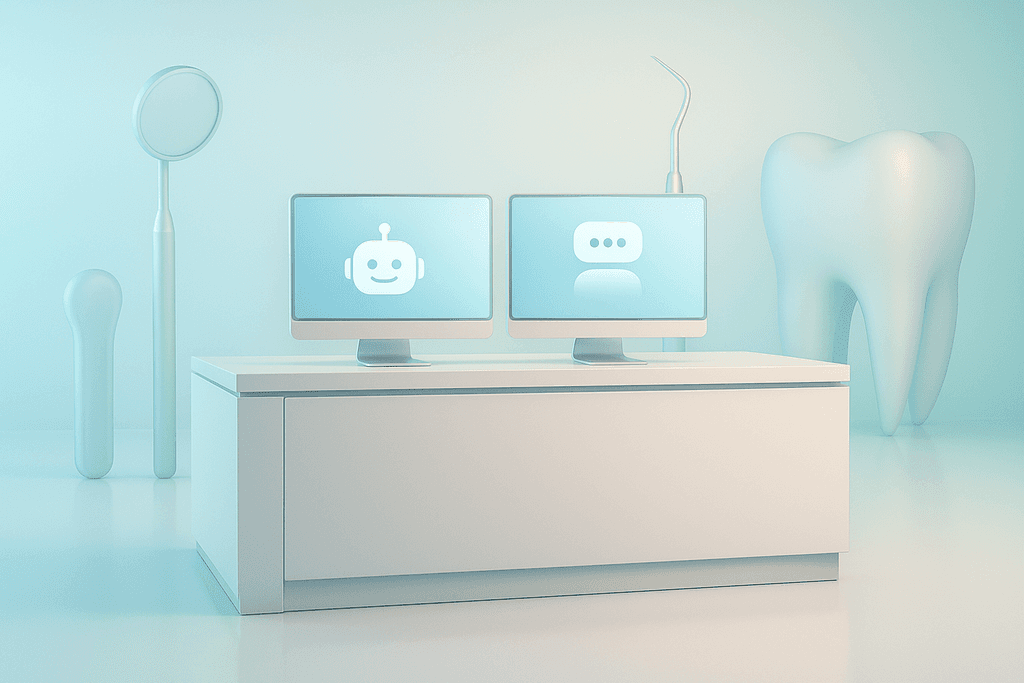Dental practices lose an average of 20 hours per week to inefficient administrative tasks, costing them thousands in lost revenue. AI chatbots are revolutionizing healthcare communication, and now they’re poised to transform dental offices. By automating routine inquiries and streamlining patient interactions, tools like The OnCall Bot can dramatically boost efficiency while enhancing patient care.
Table of Contents
Current Challenges in Dental Office Workflows
Dental offices juggle a lot of tasks beyond just cleaning teeth. Front desk staff often spend hours each day on the phone, booking appointments and answering the same questions over and over. This takes time away from helping patients in the office and other important work.

Let’s look at some common issues dental practices face:
- Scheduling headaches
- Endless phone calls
- Repetitive patient questions
- After-hours communication gaps
- Paperwork overload
These problems can really slow things down. A recent study found that dental staff spend up to 20% of their day on administrative tasks that could be automated. That’s a lot of time that could be used to help more patients!
Here’s a quick look at how inefficiencies impact dental practices:
| Issue | Impact |
|---|---|
| Phone time | 2-3 hours/day |
| Missed calls | 15-20% potential appointments lost |
| Admin tasks | 20% of staff time |
These challenges don’t just frustrate staff – they can also make patients unhappy. Long wait times on the phone or trouble booking appointments after hours can push people to look for a new dentist. And when staff are stressed and overworked, it’s harder to give patients the best care.
The good news? New tech tools are popping up to help solve these problems. AI chatbots, for example, can handle many routine tasks automatically. This frees up staff to focus on in-person patient care. In fact, some dentists are already using AI assistants to streamline their practices.
As dental offices look for ways to work smarter, not harder, tech solutions like The OnCall Bot are becoming key tools. These AI helpers can tackle many of those time-consuming tasks, letting dental teams get back to what they do best – caring for patients.
Key Features of Dental Office Chatbots
Dental practices are always looking for ways to make their offices run smoother. AI chatbots are a new tool that can help with this. These smart assistants can do a lot to make life easier for both dental staff and patients.
Here are some of the main things dental chatbots can do:
- 24/7 patient support – Patients can get help anytime, even outside office hours
- Automated appointment scheduling – Book visits without calling the office
- Answer common questions – Provide info on services, procedures, and more
- Connect with practice software – Work with existing systems
The OnCall Bot, for example, is made just for dental offices. It can handle patient questions, schedule appointments, and even give personalized info based on a patient’s history.
How Chatbots Improve Dental Care
By taking care of routine tasks, chatbots free up staff to focus on more important work. This leads to better patient care overall. Patients also like being able to get quick answers to their questions without waiting on hold.
A study on AI in dental practices found that offices using chatbots saw big improvements in efficiency and patient happiness.
Streamlining Patient Communication
Good communication is key for any dental practice. Chatbots can help make this easier in a few ways:
- Handle common questions quickly
- Send appointment reminders automatically
- Let patients book visits 24/7
- Cut down on phone calls to the office
This means less work for staff and faster service for patients. It’s a win-win.

Benefits for Patients
Patients enjoy several perks from dental chatbots:
- Get answers right away, any time of day
- Book appointments without calling
- Shorter wait times on the phone
- Easy access to their dental info
These benefits make it more likely that patients will keep up with their dental care. When it’s easy to get info and book visits, people are more likely to come in regularly.
Boosting Operational Efficiency
Chatbots don’t just help patients – they make dental offices run better too. Here’s how they can boost efficiency:
| Task | How Chatbots Help |
|---|---|
| Appointment scheduling | Automate booking, reduce no-shows |
| Patient inquiries | Answer common questions instantly |
| Data collection | Gather info before visits |
| Staff workload | Free up time for important tasks |
By handling these routine jobs, chatbots let dental staff focus on giving great care to patients in the office.
Improving Office Workflow
A smoother workflow means a better experience for everyone. Chatbots help by:
- Cutting down on paperwork
- Reducing phone interruptions
- Organizing patient info
- Streamlining follow-ups
This lets dental teams work more efficiently and give patients their full attention.
The OnCall Bot, for instance, keeps detailed records of all patient chats. This makes it easy for staff to review interactions and follow up as needed.
Data and Insights
Chatbots don’t just handle tasks – they also collect valuable data. This info can help dental practices:
- Spot common patient concerns
- Track busy times and slow periods
- Measure patient satisfaction
- Find ways to improve service
With these insights, dental offices can make smart choices to grow their practice and serve patients better.
A recent study found that AI tools like chatbots can even help dentists make better clinical decisions. This shows how these technologies are improving all aspects of dental care.

ROI and Long-term Benefits of Dental Chatbots
Dental practices investing in AI chatbots like The OnCall Bot are seeing impressive returns. Let’s break down the key benefits:
- Reduced staff workload
- 24/7 patient support
- Improved appointment scheduling
- Enhanced patient satisfaction
These advantages translate into real savings. A typical dental office spends countless hours answering basic questions and scheduling appointments. By automating these tasks, practices free up staff time for more complex patient care.
But the benefits go beyond just saving time. Let’s look at the long-term impact:
- Higher patient retention rates
- Increased new patient acquisition
- More efficient use of office resources
- Scalability for practice growth
Patients appreciate the convenience of 24/7 support, leading to better satisfaction and loyalty. This improved experience can also attract new patients through word-of-mouth referrals.
The data speaks for itself: Dental practices using AI chatbots report up to a 30% reduction in administrative workload and a 25% increase in appointment bookings. These numbers directly impact the bottom line.
| Metric | Average Improvement |
|---|---|
| Administrative time saved | 30% |
| Appointment bookings | 25% increase |
| Patient satisfaction | 20% boost |
Looking ahead, AI chatbots are becoming essential for future-proofing dental practices. As patient expectations for instant, round-the-clock service grow, practices without this technology risk falling behind. The OnCall Bot offers a simple way to stay ahead of the curve, providing scalable support that grows with your practice.
While the initial investment may give some practices pause, the long-term ROI is clear. Reduced overhead, improved efficiency, and enhanced patient experience all contribute to a healthier bottom line. For dental offices looking to boost efficiency and patient satisfaction, AI chatbots are quickly becoming a must-have tool.
Wrap-up
AI chatbots are changing the game for dental offices. They handle routine tasks, answer patient questions 24/7, and free up staff time. This means smoother operations and happier patients. But not all chatbots are created equal. Dental practices need a solution tailored to their unique needs.
The right chatbot can transform your front desk, streamline scheduling, and boost patient satisfaction. It’s all about finding the perfect fit for your practice. The OnCall Bot offers dental-specific features like appointment requesting and detailed conversation transcripts. These tools help practices work smarter, not harder.
As AI continues to evolve, dental offices that embrace this technology will stay ahead of the curve. Ready to see how a chatbot could work for your practice? Get in touch to learn more about AI solutions designed for dental care. The future of efficient, patient-centered dentistry might be just a chat away.
Common Questions About Dental Office Chatbots
How secure is patient data with chatbots?
Patient data security is a top priority for dental chatbots. They use encryption and comply with HIPAA regulations to protect sensitive information. The OnCall Bot, for example, stores conversation transcripts securely and only authorized staff can access them.
Can chatbots handle complex dental inquiries?
While chatbots excel at handling common questions, they have limits. They can provide basic information on procedures and symptoms, but complex cases are directed to human staff. This ensures patients get accurate info while saving time on simpler queries.
What’s the learning curve for staff and patients?
The learning curve is minimal for both staff and patients. Chatbots like The OnCall Bot are designed to be user-friendly. Patients interact naturally, as if texting a friend. Staff mainly need to learn how to review transcripts and follow up on requests, which is straightforward.
How does The OnCall Bot compare to generic chatbots?
The OnCall Bot is specifically built for dental practices. It understands dental terminology and common patient concerns. Generic chatbots lack this specialized knowledge, making The OnCall Bot more effective for dental offices. It can handle appointment requests and provide detailed, relevant information about dental procedures.
Will a chatbot replace our front desk staff?
No, chatbots complement rather than replace staff. They handle routine tasks, freeing up your team to focus on more complex patient needs and in-person care. This improves overall efficiency and allows your staff to provide better, more personalized service when needed.

No responses yet